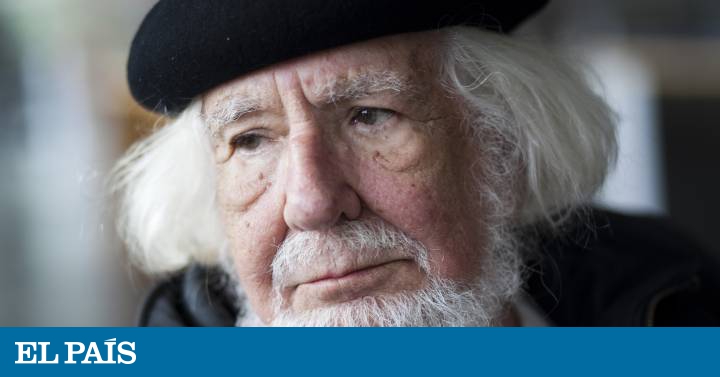Nicaraguan poet and priest Ernesto Cardenal has died this Sunday in Managua at the age of 95 due to renal and cardiac failures, sources close to the writer reported, one of the leading exponents of Latin American poetry. Cardinal was one of the most prominent representatives of the so-called liberation theology. His political commitment made him support the armed struggle against the dictatorship of Somoza, a dynasty that ruled Nicaragua for more than 40 years, and more recently stand up to the Government of President Daniel Ortega, whose excesses and arbitrariness denounced wherever he traveled to present his poetry . His commitment to the poorest and against injustices made him the moral voice of the Sandinista revolution, a project with which he made a deep commitment and earned him the reprimand of Pope John Paul II, for whom a priest could not interfere in the political issues. “Nicaragua without a National Guard, I see the new day! A land without terror. Without dynastic tyranny, ”he had written in one of his most celebrated poems, Canto Nacional .
Born in Granada (Nicaragua), on January 20, 1925. Heir to a strong poetic tradition - with prominent poets such as Rubén Darío -, Cardinal studied literature in Managua and Mexico and conducted other studies in the United States and Europe. In 1965 he was ordained a priest and later settled in the Solentiname Archipelago, located in the Great Lake of Nicaragua, where he founded a community of fishermen and primitivist artists that became world famous. It was there that he wrote his famous Solentiname Gospel. The archipelago is a pilgrimage site for the faithful readers and followers of the poet. Cardinal spent his vacations in those islands, where he read the complete works of Darius, wrote or directed the Mass of Holy Week in the small church of the town.
Sergio Ramírez, a close friend of the poet, has said of him that he is one of the great innovators of the Spanish language, by creating a new lyrical form, that of narration in poetry, which made Cardinal a chronicler of his time. “I measure Ernesto first for his gift of innovation. There are very good poets who fail to do school, and that does not take weight off his voice, but Cardinal, from the beginning he made school, had followers, opened a gap in the poetry of the language, ”said Ramirez.
The Cardinal himself defined himself as the founder of a new style, which he called in an interview with EL PAÍS as "scientific poetry." “I think I'm the only poet, or at least the only one I know, who is doing poetry about science, scientific poetry. For me it is almost like a prayer to read scientific books. I see in them what some have said are traces of God's creation. ”
Cardinal's poetry is strongly linked to the Sandinista Revolution, which in 1979 overthrew the Somoza dictatorship. In poems such as Hora Cero or El Canto Nacional, the poet highlighted the exploits of Augusto Sandino and the Sandinista guerrillas. That intimate link to politics caused the nomenclature of the Catholic Church to reject him, to the point that Pope John Paul II publicly admonished him when he visited Nicaragua in 1983, in the middle of the Sandinista era.
Cardinal, however, maintained a deep Christian love, expressed through obas such as The Psalms, verses that demonstrate his commitment to faith, but also his criticism of the injustices, oppression and suffering of the most unprotected. The poet was a tireless creator, a politically committed man until the end of his days, and a prophetic, combative and uncomfortable voice for power.
The poet has lived his own martyrdom since 2007, when Daniel Ortega returned to power in Nicaragua. Since then he has been persecuted by justice, controlled by the Sandinista leader. “They [Ortega and Murillo] own all the powers of Nicaragua. They have an absolute, infinite power, which has no limits, and that power is now against me, ”Cardenal told EL PAÍS in an interview granted at his home in Managua in 2017. Despite this persecution, Cardinal has maintained an activity tireless. He has traveled to recitals to Europe and Latin America, denouncing, in addition, the excesses of Ortega. He, who in his Cosmic Canticle wrote that poetry is "singing and enchantment for all that exists", continued working at 94 years old. On February 4 he was admitted to a hospital in Managua due to a kidney infection and although it was thought that he would not leave that hospital, the poet recovered and weeks later he received EL PAÍS at his home in Managua eating a nacatamal, a dish Nicaraguan traditional corn-based preparation.
After decades of purging by the Vatican, the poet was rehabilitated by Pope Francis. Jorge Mario Bergoglio informed him in February of the lifting of the suspension of divinis (prohibition of administering the sacraments) that Karol Wojtyla imposed on him in 1984. In an interview the Cardinal himself had recognized: “I feel identified with this new Pope. It's better than we could have dreamed it. ”
Nicaragua loses one of its most beloved writers, the man who managed to be a prophet in his land and who leaves a long literary production that in this country of catastrophes and excesses of his politicians is repeated as a prayer, as the song of a prisoner nation of their own mistakes, but eager to break with their history of oppression.

